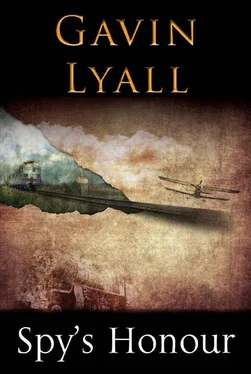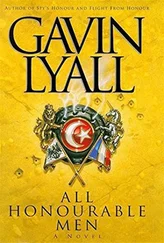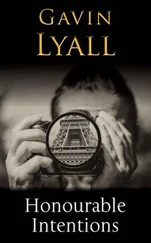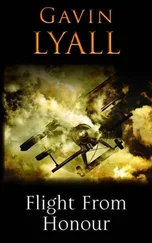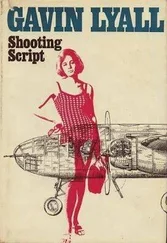Gavin Lyall - Spy’s Honour
Здесь есть возможность читать онлайн «Gavin Lyall - Spy’s Honour» весь текст электронной книги совершенно бесплатно (целиком полную версию без сокращений). В некоторых случаях можно слушать аудио, скачать через торрент в формате fb2 и присутствует краткое содержание. Год выпуска: 2013, ISBN: 2013, Издательство: PFD Books, Жанр: Шпионский детектив, Исторический детектив, на английском языке. Описание произведения, (предисловие) а так же отзывы посетителей доступны на портале библиотеки ЛибКат.
- Название:Spy’s Honour
- Автор:
- Издательство:PFD Books
- Жанр:
- Год:2013
- ISBN:0340609729
- Рейтинг книги:5 / 5. Голосов: 1
-
Избранное:Добавить в избранное
- Отзывы:
-
Ваша оценка:
- 100
- 1
- 2
- 3
- 4
- 5
Spy’s Honour: краткое содержание, описание и аннотация
Предлагаем к чтению аннотацию, описание, краткое содержание или предисловие (зависит от того, что написал сам автор книги «Spy’s Honour»). Если вы не нашли необходимую информацию о книге — напишите в комментариях, мы постараемся отыскать её.
Spy’s Honour — читать онлайн бесплатно полную книгу (весь текст) целиком
Ниже представлен текст книги, разбитый по страницам. Система сохранения места последней прочитанной страницы, позволяет с удобством читать онлайн бесплатно книгу «Spy’s Honour», без необходимости каждый раз заново искать на чём Вы остановились. Поставьте закладку, и сможете в любой момент перейти на страницу, на которой закончили чтение.
Интервал:
Закладка:
“Yer fooling me.”
“No, all of that’s true. Mind, I’m not saying the coup would have worked, the King would have come back. But it gives you an idea of how fragile French politics can be. And still are.”
13
They sat around the end of a long walnut table, waited on by Gaston and the manservant: vegetable soup, trout, and lamb cutlets – the first Ranklin had seen that year – in aspic. The aspic was probably new to O’Gilroy, but he would have eaten the cutlets with the wool still on. The General merely picked at his food; like most men of his age, he lived in short bursts of energy and talkativeness, and being gallant to Corinna and angry about Boulanger had exhausted him. Ranklin made one attempt to ask about Corinna’s husband and was told one did not talk about ladies at table. He went back to twiddling his wine glass.
Although it was still light outside, and they were eating absurdly early, the heavy curtains had been drawn and the room lit by silver candelabra. The colours enriched by the half-dark, the glints of light on china and glass, the shadows wavering in the slight draught – all gave a stagy effect. Perhaps doubly so, because Ranklin guessed that in daylight the room would seem as tawdry as stage scenery. And weren’t they in a play – acting parts and speaking meaningless lines until – until what?
It came when Gaston leant down to whisper a discreet something in the General’s ear and the old man gazed sombrely first at Ranklin, then O’Gilroy. Somebody, Ranklin thought grimly, has searched our room and not found what he was looking for. The General sighed. “Gentlemen, you are both royalists also.”
Since O’Gilroy probably hadn’t believed in any king since Brian Boru, Ranklin said quickly: “I am an officer in His Britannic Majesty’s Army.”
The General grunted. “In the past our countries have fought many times, honourably. Now, soon, we will fight together. But victory is only possible if France is led by a true king, His Majesty Philippe. I comprehend, Captain, that you carry to Paris a code for our Army. On behalf of His Majesty I will accept the code and you may report that it has been correctly delivered.”
That simple statement would have silenced a Welsh politician; it struck Ranklin dumb as a statue. The implications of it swam blurred and dreamily round his mind; the only hard-and-fast thought he could cling to was that the General was monumentally loony.
And the only thing he could think of to do was to play – indeed, overplay – his own part in this farce. “General, you must understand that I have my orders, and as I hold the King’s Commission, these orders come, in effect, from my King. I am ordered to deliver the code to Paris.”
“Paris is full of traitors.”
Perhaps so, Ranklin reflected, since the General shouldn’t have heard of the code at all.
“The code will be safe,” the General went on, “only in the hands of a loyal servant of His Majesty.” And he held out one such quavering hand.
Trying not to break down into wild and disastrous laughter, Ranklin stiffened in his chair. He knew his chubby figure didn’t play dignity well, but he did his best. “General, I am an officer entrusted with a mission. You have warned me that my mission is endangered, and I am deeply grateful. Now, if you would kindly permit me to contact my superiors in London and inform them of the situation, I shall obey their new orders.”
The General sipped his wine, wiped his mouth on his napkin, and nodded to Gaston, who nodded towards the door. Ranklin saw O’Gilroy tense.
Gunther Arnold came into the room with Sergeant Clement close behind.
“You have met M’sieu van der Brock,” the General said.
“Yes,” Ranklin agreed. “But perhaps I misheard the name.”
Gunther, wearing a dark suit straining at its buttons and a floppy bow tie, just smiled and slid into a chair opposite Ranklin. Gaston brought a glass and poured him wine. Clement stayed back in the shadows.
Realising they were waiting for him to speak, Ranklin ignored Gunther and said to the General: “Do you believe my superiors in London are also traitors? If so, they could have given the code to an enemy directly. They still can. Instead, they entrusted it to me to deliver to Paris.”
“To the traitors in Paris,” Gunther said smoothly, and Ranklin saw his argument crumble like Jericho’s walls.
“This,” O’Gilroy observed, “is getting a mite more tangled than who owns M’Ginty’s cow.”
Ranklin glared angrily at him and, now desperate, tried again with the General: “But if we have traitors in London who know the code, then it becomes valueless – worse, a liability – to your King. ”
But Gunther was wearing a small, satisfied smile and, looking at the General, Ranklin suddenly guessed why: the old relic simply didn’t know the first thing about codes. In his campaigns, which in the last forty years could only have been against tribesmen in the French colonies, he wouldn’t have needed codes. He might just know what they were, but saw them as things that kept an intrinsic value no matter who owned them, like a sword or a barrel of gunpowder.
And he also saw that, loony or not, the General was completely sincere. He simply wanted the code for his “King”, and presumably believed it was going to get there. How? By hand of Gunther, probably, on his travels as a cigar merchant. Which in turn meant that Gunther was manipulating the General, using his royalist connections in Paris – in the Ministere de la Guerre especially – and …
Perhaps he let something show in his face, because Gunther said quickly: “Perhaps I might talk to Captain Ranklin alone for a moment? As a young man, an officer of little experience, he does not have the instinct of duty and honourable behaviour that you expect. As someone closer to his age, perhaps I can persuade him where his duty lies.”
Ranklin was about to say in frozen terms that no rotten spy could teach him anything about duty and honour when he remembered that he was a rotten spy himself and that such words would mean nothing to Gunther anyway. And there was always a chance that Gunther didn’t know Ranklin was a spy and not an ordinary officer picked by chance for a courier’s job. Not that the amount of training he’d been given made that much difference, he thought sourly. But there still had to be a reason why they hadn’t just been scragged, and Gunther was the man in charge.
So he said: “If the General allows it, I will listen to Heer van der Brock.”
When they were outside the dining room, standing in front of the portrait of the Duc d’Orleans, who, Ranklin now realised, knew nothing of this affair, of Gunther and perhaps even the General, but had still been a bloody Greenjacket, Gunther lit a small cigar.
Then he said abruptly: “We know there should be three copies of the code and unless you show me two others, we must believe the one you left upstairs is false.” His English had improved, Ranklin noted, since he became a Dutchman.
“You are new to these matters,” Gunther continued. “So I will explain how they are conducted: the code is already compromised by your unfortunate delay. Would you trust the lives of men, of armies, to a code that has unaccountably vanished for a few hours? I think not. I think also it will not be of helping your career. So I will help you: you must sell me the code.”
Ranklin had been determined to keep a face of stone, but this offer chipped it badly. He may even have gaped.
Gunther smiled, leaking cigar smoke. “Consider the result: you will have the assurance that I will not betray you because it would be to betray myself. And I will have the assurance that you will not betray me because I can say you sold the code for money. It will be in both our interests to pretend that nothing has happened. No?
Читать дальшеИнтервал:
Закладка:
Похожие книги на «Spy’s Honour»
Представляем Вашему вниманию похожие книги на «Spy’s Honour» списком для выбора. Мы отобрали схожую по названию и смыслу литературу в надежде предоставить читателям больше вариантов отыскать новые, интересные, ещё непрочитанные произведения.
Обсуждение, отзывы о книге «Spy’s Honour» и просто собственные мнения читателей. Оставьте ваши комментарии, напишите, что Вы думаете о произведении, его смысле или главных героях. Укажите что конкретно понравилось, а что нет, и почему Вы так считаете.
